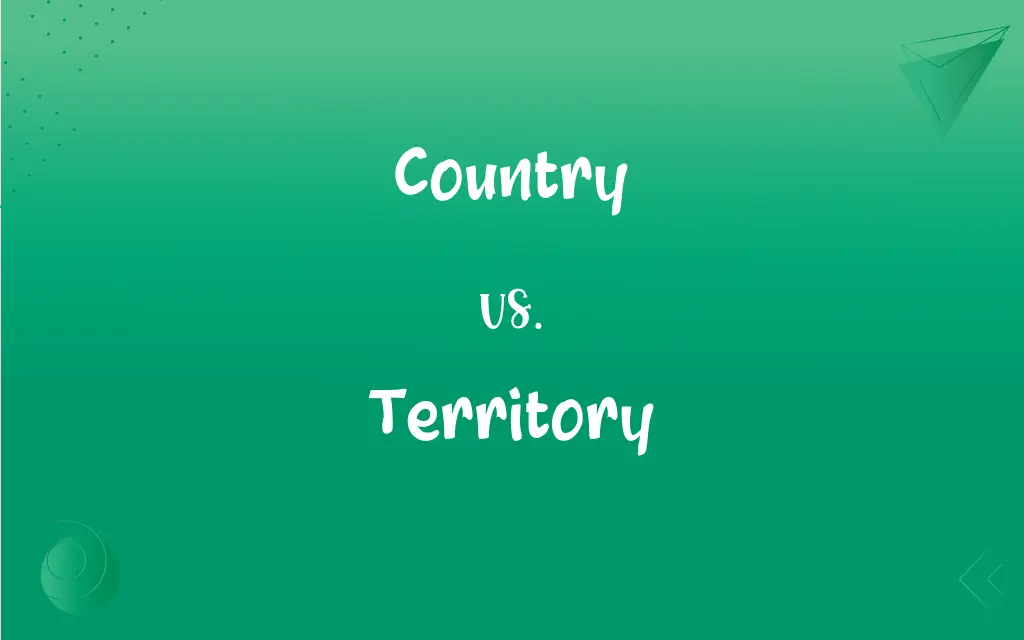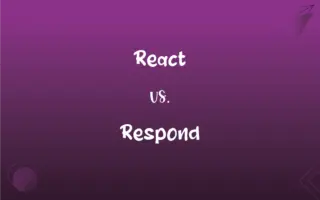Country vs. Territory: What's the Difference?
Edited by Janet White || By Harlon Moss || Updated on November 6, 2023
A country is a sovereign state with its own government, while a territory is a defined area, often without full sovereign rights.

Key Differences
A country is recognized as a distinct entity in political geography, typically represented by a centralized government that exercises sovereignty over a certain geographical area. Its identity is defined by legal and diplomatic recognition that confers rights and responsibilities. A territory, on the other hand, refers to a geographic area that is claimed and controlled by a country, but it may not possess full sovereignty and may be subject to various degrees of autonomy or restrictions.
The term country implies a certain level of political organization and governance, with a permanent population, a defined territory, and the capacity to enter into relations with other states. It is often used interchangeably with 'state' or 'nation', signaling full independence and recognition at the international level. In contrast, territory signifies a region or land that is under the jurisdiction of a country but doesn't always imply the presence of a government or sovereignty.
When discussing international law and diplomacy, countries are recognized as members of the international community with full sovereignty and governance structures, able to enact laws and policies within their borders. Territories, in this context, might lack certain attributes of a fully sovereign state and might be governed by another country, often waiting for or in the process of gaining independence or other forms of self-governance.
Countries are typically member states of the United Nations and are seen as equals in formal international relations, possessing a degree of diplomatic power and authority. Territories can be regions within a country, such as a province or state, or external lands with varied degrees of self-rule, and may not have representation in international bodies like the UN.
Countries have a well-defined legal status and enjoy a host of rights and obligations under international law, such as the right to defend territorial integrity. Territories, however, may not have a clear legal status internationally, may be subject to dispute, and often rely on the country that governs them for international legal representation and defense.
ADVERTISEMENT
Comparison Chart
Sovereignty
Possesses full sovereignty.
May not have full sovereignty.
Recognition
Recognized as a state by the international community.
Recognition may vary; not always a sovereign state.
Governance
Has its own government and constitution.
May be governed by another country's laws.
Status in International Law
Has defined status and rights.
May lack defined international legal status.
Autonomy
Autonomous with power to govern itself.
May have limited self-rule or autonomy.
ADVERTISEMENT
Country and Territory Definitions
Country
A nation with its own government and defined borders.
Canada is a country known for its natural beauty and multicultural cities.
Territory
An area of land under the jurisdiction of a ruler or state.
Puerto Rico is a territory of the United States.
Country
A politically organized community living under a single government.
Japan is a country that consists of several islands.
Territory
The geographical area belonging to or under the control of a governmental authority.
The Northern Territory of Australia is known for its Outback desert landscapes.
Country
A region identified as a distinct entity in political geography.
Brazil is the largest country in South America.
Territory
A region that is defended against intruders, especially by an animal.
The robin aggressively defended its territory from intruders during nesting season.
Country
The territory of a nation with distinct cultural, political, or historical features.
Italy is a country rich in history and art.
Territory
A district or region with a particular characteristic, purpose, or use.
The wildlife territory is protected from urban development.
Country
The people of a nation, region, or state.
The whole country celebrated when the team won the championship.
Territory
A zone of space, land, or water which is owned or inhabited by a person or an animal.
The tiger marked its territory in the dense forest.
Country
A nation or state.
Territory
An area of land; a region.
Country
The territory of a nation or state; land.
Territory
The land and waters under the jurisdiction of a government.
FAQs
Can a country own a territory?
Yes, a country can exercise control over a territory without it being sovereign.
What defines a country?
A country is defined by its sovereignty, government, population, defined borders, and recognition by other states.
Can a territory be considered a country?
Not usually; a territory lacks full sovereignty which is a key characteristic of a country.
Does a country have to be recognized by others?
Generally, yes, recognition is important for a country's status in international law and diplomacy.
What rights do countries have that territories do not?
Countries have the right to diplomatic relations and control over their defense and foreign policy, unlike territories.
Is a territory always part of a larger country?
Often, but not always, territories can also be regions with some autonomy or areas under international supervision.
Can territories participate in international organizations?
Usually, territories cannot, unless through the country that governs them.
Can a country's territory be disputed?
Yes, countries often have territorial disputes with neighbors or regions seeking independence.
Do territories have borders?
Yes, but the borders of territories are often within the country that holds sovereignty over them.
Can a country lose its status?
Yes, through dissolution, occupation, or loss of recognition, a country can cease to exist as a separate entity.
Can a territory become a country?
Yes, through processes like decolonization or declarations of independence, subject to recognition.
What is an example of a territory that is not part of a country?
Antarctica is an example of a territory not owned by any country, governed by international treaty.
Do territories have their own governments?
Some do, but they may not have the full range of powers that a country's government does.
Are passports issued by territories recognized internationally?
Typically, passports are issued by the governing country, not the territory itself.
Can a country exist without recognized borders?
It's rare and problematic as borders define a country's area of legal and recognized sovereignty.
Who governs a federal territory?
A federal territory is usually governed by the federal government rather than its own local government.
How does international law view territories?
Territories may be seen as possessions or administrative divisions of countries with varying degrees of self-rule.
What happens when a territory wants independence?
There may be negotiations, referendums, and international involvement to determine the outcome.
Are all countries fully sovereign?
Most are, but there are some countries with limited recognition and contested sovereignty.
How does a territory gain sovereignty?
Through legal processes, referendums, negotiations, or sometimes conflict leading to independence.
About Author
Written by
Harlon MossHarlon is a seasoned quality moderator and accomplished content writer for Difference Wiki. An alumnus of the prestigious University of California, he earned his degree in Computer Science. Leveraging his academic background, Harlon brings a meticulous and informed perspective to his work, ensuring content accuracy and excellence.
Edited by
Janet WhiteJanet White has been an esteemed writer and blogger for Difference Wiki. Holding a Master's degree in Science and Medical Journalism from the prestigious Boston University, she has consistently demonstrated her expertise and passion for her field. When she's not immersed in her work, Janet relishes her time exercising, delving into a good book, and cherishing moments with friends and family.































































